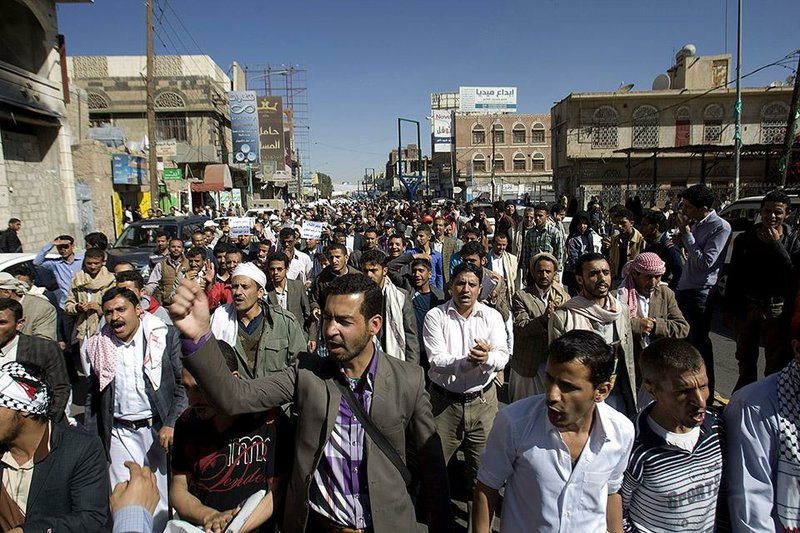SANAA, Yemen -- Thousands of Yemenis took to the streets of the capital, Sanaa, and other cities Saturday to denounce what they called the coup against President Abed Rabbo Mansour Hadi by Shiite Houthi rebels.
Chanting "No Houthis after today," the protesters called on the militias to leave the cities they have taken over since September and urged Hadi to withdraw his Thursday resignation. His Cabinet also resigned. Houthi representatives didn't attend talks Saturday with the United Nations envoy to Yemen, Jamal Benomar, and different political parties that aimed to resolve the crisis, Abdullah Noman, the secretary-general of the Nasserist Party, said.
Some 20,000 protesters carried banners and chanted slogans denouncing the rebels and demanding the restoration of the president. Scuffles involving knives and batons broke out in one instance in Sanaa when the rebels tried to block one procession, leaving two demonstrators and one Houthi injured.
"Houthi aggressors, out of the capital," went one chant, and "Hadi, Hadi, return. Your people are awake," said another. One slogan accused the Houthis, who adhere to a sect of Shiism, of being clients of mostly Shiite Iran, while another said they were colluding with Hadi's predecessor, longtime autocrat Ali Abdullah Saleh.
The officials, who spoke on condition of anonymity because they were not authorized to brief reporters, said tens of thousands also demonstrated in the cities of Taiz, Ibb and Dhamar with similar demands.
The Houthis, who say they are fighting corruption, said in a statement Friday night that they would work to bring about a smooth, democratic transfer of power after the resignations.
The Houthi seizure of Hadi's palace earlier this month has raised the risk that the country may fracture, raising concerns that a power vacuum will enable al-Qaida to further expand its operations in a country that borders Saudi Arabia, the world's top oil exporter. Yemen's government has struggled to exert authority over much of the country as it faces challenges from ethnic separatists, political protesters and Islamist militants.
Fighting spread beyond the capital Thursday as Houthi militias clashed with tribes in the oil-producing province of Marib, east of Sanaa. Leaders in the province said the army should obey orders of the governor or military commander, according to an emailed statement from the governor's office.
In the central province of Ibb, Houthi rebels failed to disperse the protesters, according to Mohammed Jamal, a protest organizer who spoke by phone. Similar demonstrations were held Friday. In the Red Sea port city of Hodeida, thousands marched against the Houthis, Abdulkarim al-Ayashi, a protester, said by phone.
Security officials said Houthi gunmen fired on demonstrators in Hodeida, injuring three people.
The Houthis, who captured several cities as they drove south from their northern strongholds in the summer, seek greater representation in government ministries and on a committee to rewrite the country's constitution. They now face mounting pressures and internal divisions, however.
Ali al-Bukhaiti, a prominent member of the group's political arm, resigned Friday over what he described as a dangerous political polarization that could turn regional and secular and eventually break up the country. He offered to work as a mediator between the groups.
In Marib province, security forces and officials said they are refusing to receive orders from Sanaa, security officials said.
Governors in Aden, in southern Yemen, issued a statement "condemning the coup" and declaring their "support for President Hadi."
Lawmakers will vote today on whether to approve the resignation of Hadi, installed as part of a U.S. and Saudi-backed accord in 2012. Hadi announced his decision to quit after Houthi fighters reneged on a deal to withdraw from the presidential palace, which they stormed Tuesday after two days of violent clashes.
Should it be accepted, or should Hadi simply refuse to rule, law dictates that the job would go to Parliament Speaker Yahia al-Rai -- a close Saleh ally.
The rebels from Yemen's north, who say they have been marginalized by Sunni Muslims for decades, have become an increasingly influential force since the ouster of Saleh in a popular uprising in 2011.
Yemen was reunified in 1990, after decades of division into northern and southern states.
Information for this article was contributed by Mohammed Hatem, Donna Abu-Nasr and Glen Carey of Bloomberg News and by Ahmed al-Haj of The Associated Press.
A Section on 01/25/2015

